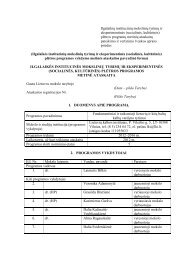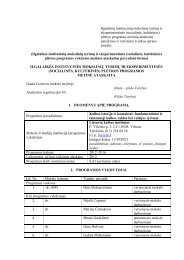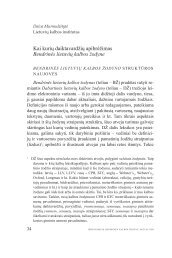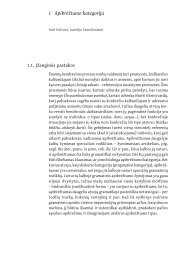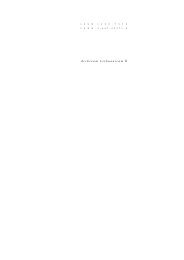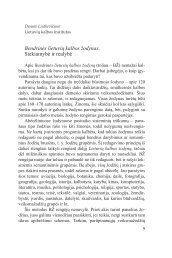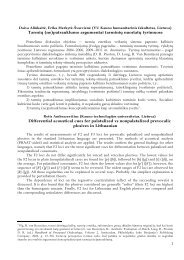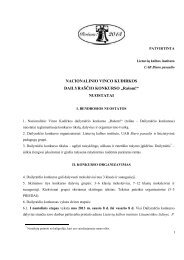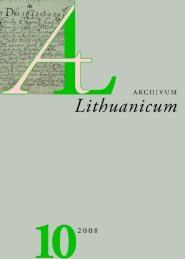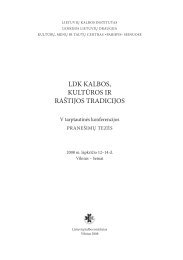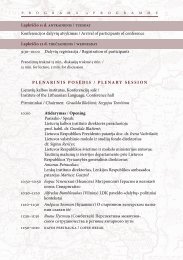archivum lithuanicum 2 (4,26 mb) - Lietuvių kalbos institutas
archivum lithuanicum 2 (4,26 mb) - Lietuvių kalbos institutas
archivum lithuanicum 2 (4,26 mb) - Lietuvių kalbos institutas
Create successful ePaper yourself
Turn your PDF publications into a flip-book with our unique Google optimized e-Paper software.
title the words “integrity in Europe” should be replaced by “integration into Europe”<br />
which seems to be the subject of the paper.<br />
The author of the second article, “The first Lithuanian book and the period of<br />
formation of the new culture trait-complex” (pp. 31-57) Ingë Lukðaitë examines the<br />
cultural context of printing in Lithuania. Possibly only persons with a feeling for<br />
contemporary English style will find the title of the third article, “The road of the<br />
book to Lithuania” (pp. 59-99) awkward. In this article Edvardas Gudavièius discusses<br />
the writing and printing of books in Lithuania and notes that Lithuanian<br />
books were in the minority among books published in l6th century Lithuania.<br />
Americans are notorious for their inability to distinguish transitive and intransitive<br />
verbs, but still the following sentence (p. 63) will evoke at least a smile from most<br />
Americans: “[...] it [i.e., published books—W. R. S] increased the amount of knowledge<br />
received by the elite strata and rose [sic!] its level [...]” As Gertrude Stein<br />
wrote: “A rose is a rose is a rose,” but this one should have been raised. On p. 66<br />
we read: “The earliest arengas of acts, adopted from Polish formulars, define good<br />
deeds as an action rewarded by God.” I had never heard the English word arenga<br />
before so I looked it up in Webster’s Third International Dictionary where I found the<br />
single definition (p. 116): “a genus of tropical Asiatic and Malaysian palms having<br />
pendent spadices and berrylike fruits.” In the Lithuanian Academy Dictionary (LKÞ<br />
I 297) the closest to arenga was arendà ‘rent.’ I could not find arenga either in Lewis<br />
and Short’s A Latin Dictionary (Oxford, 1975). I doubt that the author of the article<br />
had in mind “Asiatic and Malaysian palms.” From the sentence it seems that the<br />
author intended some kind of document, but exactly what kind of document is<br />
unclear to me.<br />
For me Zigmas Zinkevièius’ article, “Linguistic sources of Martynas Maþvydas’<br />
writings, and manuscript texts before Maþvydas” (pp. 101-123) seems, for some<br />
reason or other, to be in somewhat better English and therefore easier to understand.<br />
Of course, I am familiar with Zinkevièius’ views from other sources and this<br />
may have aided in understanding his views on the origin of Maþvydas language<br />
and the other sources for the origin of Lithuanian writing.<br />
Albinas Jovaiðas’ article, “Martynas Maþvydas’ catechetical activities” (pp. 125-<br />
139) discusses Maþvydas’ work as a teacher of the catechism, but Jovaiðas also<br />
notes that Maþvydas served not only God, but the “native word,” i.e., the Lithuanian<br />
nation (p. 139). In her article “Martynas Maþvydas’ Catechism: Tradition and<br />
signs of a new consciousness” (pp. 141-157) Dainora Pociûtë-Abukevièienë writes<br />
(p. 143) that the early Lithuanian and Protestant works of literature were not copies<br />
of analogous Western books, but where rather “oriented towards solutions of culture-specific<br />
problems.”<br />
Juozas Karaciejus in his article, “The first book and its addressee” (pp. 159-172)<br />
discusses again the vexed question of the month of publication of Maþvydas’<br />
Catechism and concludes (p. 164): “[...] it is possible to draw the conclusion that the<br />
printing of Maþvydas’ Catechism, which was finished late in 1547, was started<br />
220 Archivum Lithuanicum 2




